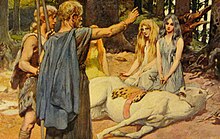
In Norse mythology, Freyja is a goddess associated with love, beauty, fertility, sex, war, gold, and seiðr. Freyja is the owner of the necklace Brísingamen, rides a chariot pulled by two cats, is accompanied by the boar Hildisvíni, and possesses a cloak of falcon feathers. By her husband Óðr, she is the mother of two daughters, Hnoss and Gersemi. Along with her twin brother Freyr, her father Njörðr, and her mother, she is a member of the Vanir. Stemming from Old Norse Freyja, modern forms of the name include Freya, Freyia, and Freja.

In Norse mythology, Njörðr is a god among the Vanir. Njörðr, father of the deities Freyr and Freyja by his unnamed sister, was in an ill-fated marriage with the goddess Skaði, lives in Nóatún and is associated with the sea, seafaring, wind, fishing, wealth, and crop fertility.
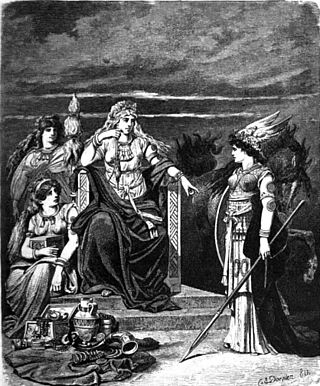
In Norse mythology, Gná is a goddess who runs errands in other worlds for the goddess Frigg and rides the flying, sea-treading horse Hófvarpnir. Gná and Hófvarpnir are attested in the Prose Edda, written in the 13th century by Snorri Sturluson. Scholarly theories have been proposed about Gná as a "goddess of fullness" and as potentially cognate to Fama from Roman mythology. Hófvarpnir and the eight-legged steed Sleipnir have been cited examples of transcendent horses in Norse mythology.

In Norse mythology, Hlín is a goddess associated with the goddess Frigg. Hlín appears in a poem in the Poetic Edda, compiled in the 13th century from earlier traditional sources, the Prose Edda, written in the 13th century by Snorri Sturluson, and in kennings found in skaldic poetry. Scholars have debated whether the stanza referring to her in the Prose Edda refers to Frigg. Hlín serves as a given name in Iceland, and Hlín receives veneration in the modern era in Germanic paganism's modern extension, Heathenry.
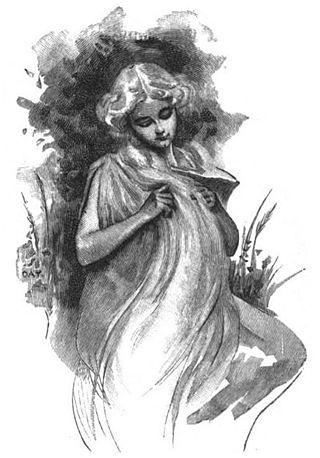
In Norse mythology, Sif is a golden-haired goddess associated with earth. Sif is attested in the Poetic Edda, compiled in the 13th century from earlier traditional sources, and the Prose Edda, written in the 13th century by Snorri Sturluson, and in the poetry of skalds. In both the Poetic Edda and the Prose Edda, she is known for her golden hair and is married to the thunder god Thor.
In Norse mythology, Sæhrímnir is the creature killed and eaten every night by the Æsir and einherjar. The cook of the gods, Andhrímnir, is responsible for the slaughter of Sæhrímnir and its preparation in the cauldron Eldhrímnir. After Sæhrímnir is eaten, the beast is brought back to life again to provide sustenance for the following day. Sæhrímnir is attested in the Poetic Edda, compiled in the 13th century from earlier traditional material, and the Prose Edda, written in the 13th century by Snorri Sturluson.

Jörð is the personification of earth and a goddess in Norse mythology. She is the mother of the thunder god Thor and a sexual partner of Odin. Jörð is attested in Danish history Gesta Danorum, composed in the 12th century by Danish historian Saxo Grammaticus; the Poetic Edda, compiled in the 13th century by an unknown individual or individuals; and the Prose Edda, also composed in the 13th century. Her name is often employed in skaldic poetry and kennings as a poetic term for land or earth.

Ēostre is a West Germanic spring goddess. The name is reflected in Old English: *Ēastre, Old High German: *Ôstara, and Old Saxon: *Āsteron. By way of the Germanic month bearing her name, she is the namesake of the festival of Easter in some languages. The Old English deity Ēostre is attested solely by Bede in his 8th-century work The Reckoning of Time, where Bede states that during Ēosturmōnaþ, pagan Anglo-Saxons had held feasts in Ēostre's honour, but that this tradition had died out by his time, replaced by the Christian Paschal month, a celebration of the resurrection of Jesus.
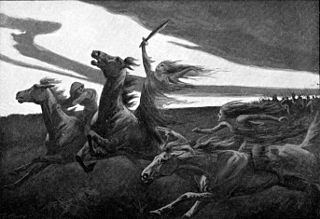
In Norse mythology, a dís is a female deity, ghost, or spirit associated with Fate who can be either benevolent or antagonistic toward mortals. Dísir may act as protective spirits of Norse clans. It is possible that their original function was that of fertility goddesses who were the object of both private and official worship called dísablót, and their veneration may derive from the worship of the spirits of the dead. The dísir, like the valkyries, norns, and vættir, are always referred collectively in surviving references. The North Germanic dísir and West Germanic Idisi are believed by some scholars to be related due to linguistic and mythological similarities, but the direct evidence of Anglo-Saxon and Continental German mythology is limited. The dísir play roles in Norse texts that resemble those of fylgjur, valkyries, and norns, so that some have suggested that dísir is a broad term including the other beings.

In Norse mythology, Óðr or Óð, sometimes anglicized as Odr or Od, is a figure associated with the major goddess Freyja. The Prose Edda and Heimskringla, written in the 13th century by Snorri Sturluson, both describe Óðr as Freyja's husband and father of her daughter Hnoss. Heimskringla adds that the couple produced another daughter, Gersemi. A number of theories have been proposed about Óðr, generally that he is a hypostasis of the deity Odin due to their similarities.
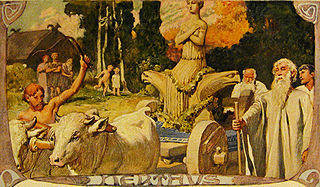
In Germanic paganism, Nerthus is a goddess associated with a ceremonial wagon procession. Nerthus is attested by first century AD Roman historian Tacitus in his ethnographic work Germania.

According to Tacitus's Germania, Tuisto is the legendary divine ancestor of the Germanic peoples. The figure remains the subject of some scholarly discussion, largely focused upon etymological connections and comparisons to figures in later Germanic mythology.

Sól or Sunna is the Sun personified in Germanic mythology. One of the two Old High German Merseburg Incantations, written in the 9th or 10th century CE, attests that Sunna is the sister of Sinthgunt. In Norse mythology, Sól is attested in the Poetic Edda, compiled in the 13th century from earlier traditional sources, and the Prose Edda, written in the 13th century by Snorri Sturluson.

In Norse mythology, Himinbjörg is the home of the god Heimdallr. Himinbjörg is attested in the Poetic Edda, compiled from earlier traditional sources, and the Prose Edda and Heimskringla, both written in the 13th century by Snorri Sturluson. Himinbjörg is associated with Heimdallr in all sources. According to the Poetic Edda, Heimdallr dwells there as watchman for the gods and there drinks fine mead, whereas in the Prose Edda Himinbjörg is detailed as located where the burning rainbow bridge Bifröst meets heaven. Scholars have commented on the differences between the two attestations and linked the name of the mythical location to various place names.

In Norse mythology, Sága is a goddess associated with the location Sökkvabekkr. At Sökkvabekkr, Sága and the god Odin merrily drink as cool waves flow. Both Sága and Sökkvabekkr are attested in the Poetic Edda, compiled in the 13th century from earlier traditional sources, and in the Prose Edda, written in the 13th century by Snorri Sturluson. Scholars have proposed theories about the implications of the goddess and her associated location, including that the location may be connected to the goddess Frigg's fen residence Fensalir and that Sága may be another name for Frigg.
Neorxnawang is an Old English noun used to translate the Christian concept of paradise in Anglo-Saxon literature. Scholars propose that the noun originally derives from Germanic mythology, referring to a "heavenly meadow" or place without toil or worries.

In Norse mythology, Hjúki and Bil are a brother and sister pair of children who follow the personified Moon, Máni, across the heavens. Both Hjúki and Bil are solely attested in the Prose Edda, written in the 13th century by Snorri Sturluson. Scholarly theories that surround the two concern their nature, their role as potential personifications of the craters on the Moon or its phases, and their relation to later folklore in Germanic Europe. Bil has been identified with the Bilwis, an agriculture-associated figure that is frequently attested in the folklore of German-speaking areas of Europe.

Norse, Nordic, or Scandinavian mythology, is the body of myths belonging to the North Germanic peoples, stemming from Old Norse religion and continuing after the Christianization of Scandinavia, and into the Nordic folklore of the modern period. The northernmost extension of Germanic mythology and stemming from Proto-Germanic folklore, Norse mythology consists of tales of various deities, beings, and heroes derived from numerous sources from both before and after the pagan period, including medieval manuscripts, archaeological representations, and folk tradition. The source texts mention numerous gods such as the thunder-god Thor, the raven-flanked god Odin, the goddess Freyja, and numerous other deities.
In Norse mythology, the sister-wife of Njörðr is the unnamed wife and sister of the god Njörðr, with whom he is described as having had the twin children Freyr and Freyja. This shadowy goddess is attested to in the Poetic Edda poem Lokasenna, recorded in the 13th century by an unknown source, and the Heimskringla book Ynglinga saga, a euhemerized account of the Norse gods composed by Snorri Sturluson also in the 13th century but based on earlier traditional material. The figure receives no further mention in Old Norse texts.
